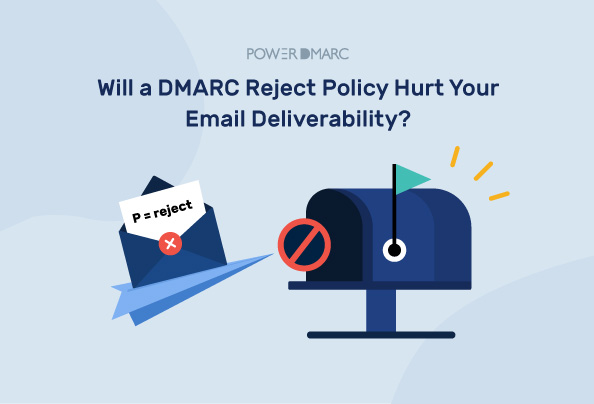We are here to once and for all clarify one of the most common concerns raised by domain owners. Will a DMARC reject policy hurt your email deliverability? Long answer short: No. A DMARC reject policy can only harm your email deliverability when you have configured DMARC incorrectly for your domain, or have taken an enforced DMARC policy too casually so as not to enable DMARC reporting for your domain. Ideally, DMARC is designed to improve your email deliverability rates over time.
What is a DMARC Reject Policy?
A DMARC reject policy is a state of maximum DMARC enforcement. This means that if an email is sent from a source that fails DMARC authentication, that email would be rejected by the receiver’s server and would not be delivered to him. A DMARC reject policy is beneficial for organizations as it helps domain owners put an end to phishing attacks, direct-domain spoofing, and business email compromise.
When should you configure this policy?
As DMARC experts, PowerDMARC recommends that while you are an email authentication novice, DMARC at monitoring only is the best option for you. This would help you get comfortable with protocol while keeping track of your email’s performance and deliverability. Learn how you can monitor your domains easily in the next section.
When you are confident enough to adopt a stricter policy, you can then set up your domain with p=reject/quarantine. As a DMARC user, your main agenda should be to stop attackers from successfully impersonating you and tricking your clients, which cannot be achieved with a “none policy”. Enforcing your policy is imperative to gain protection against attackers.
Where can you go wrong?
DMARC builds on protocols like SPF and DKIM which have to be preconfigured for the former to function correctly. An SPF DNS record stores a list of authorized IP addresses that are allowed to send emails on your behalf. Domain owners can mistakenly miss out on registering a sending domain as an authorized sender for SPF. This is a relatively common phenomenon among organizations using several third-party email vendors. This can lead to SPF failure for that particular domain. Other mistakes include errors in your DNS records and protocol configurations. All of this can be avoided by availing of hosted email authentication services.
How to Monitor Your Emails with a DMARC Report Analyzer
A DMARC report analyzer is an all-in-one tool that helps you monitor your domains across a single interface. This can benefit your organization in more ways than one:
- Gain complete visibility and clarity on your email flow
- Shift to a reject policy without the fear of deliverability issues
- Read DMARC XML reports in a simplified and human-readable format
- Made changes to your DNS records in real-time using actionable buttons without accessing your DNS
Configure DMARC safely and correctly at your organization using a DMARC analyzer today, and permanently eliminate all fears pertaining to deliverability issues!
